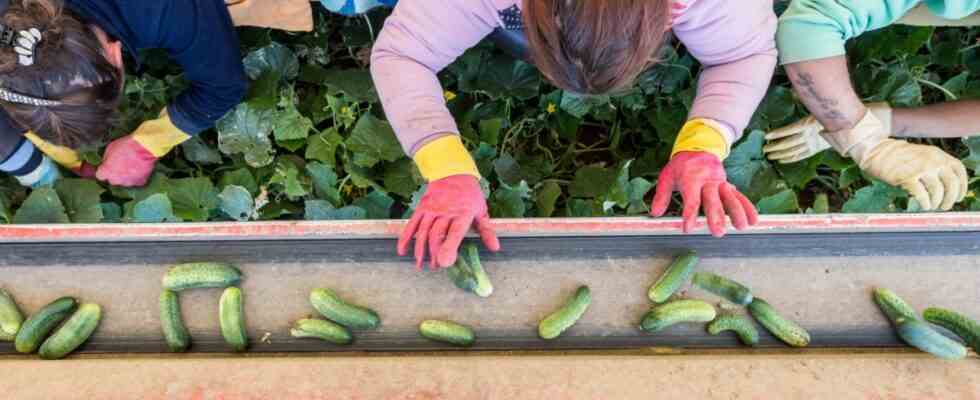About 135,000 seasonal workers came to Germany every year, almost all from Eastern Europe. There will be a similar number this spring, summer and autumn when berries are picked, asparagus are cut and wine is harvested. When the products are finally in the supermarket, the precarious conditions under which they were made will no longer be visible.
For example, there is the harvest worker from Romania who gets severe toothache and is not allowed to see the doctor by his foreman. There are the Georgians who pick strawberries and live in containers full of mold and cockroaches. And then there are the three Ukrainians who, after two months of toil in the fields, have 300 euros deducted from their meager wages under a pretext.
Some things have gotten a little better, according to the report by the Fair Agricultural Work Initiative, which the IG Bau union and the German trade union federation presented on Thursday. The situation is no longer as bad as it was at the peak of the pandemic, when the harvest workers were crammed into buses and cramped group accommodation and entire farms turned into hotspots.
“These are partly intolerable conditions in the accommodation and in the fields”
For example, employers now have to register their workers with health insurance. The federal government also increased the minimum wage, which the harvest workers must also receive, to 12 euros per hour in October. And yet Harald Schaum, deputy head of IG Bau, says: “These are partly intolerable conditions in the accommodation and on the fields.”
According to the unions, there are two major issues that continue to pose major problems for harvest workers – wages and health protection. For them, the minimum wage of 12 euros actually means a clear improvement, but the question is how many employees actually get it. On the one hand, there is a payment system that is hardly transparent, especially not for people who only come to Germany for a few months a year and hardly speak the language. The harvest workers get a basic wage per hour, but are also paid according to how many kilograms they have harvested.
Both the wages per kilo and the hours worked are far too easy to manipulate, the unions criticize, in practice this leads to “dumping piecework wages”. The foreman usually writes down the working hours by hand, the employees themselves receive no receipts. In addition, wages are usually only paid on the last day. “The employees are then about to leave and are under great time pressure,” says Anja Piel from the DGB board. Disagreements could then hardly be clarified. Again and again, employers illegally depressed wages by charging usurious rents for poor accommodation or the cost of work materials, such as gloves or scissors.
Only about one percent of the companies were checked at all
According to the unions, compliance with the minimum wage is also monitored far too seldom. The customs financial control for undeclared work, which is responsible for this, only checked about one percent of the companies in 2021, and the rate was even lower in the first half of 2022. They demand that the state must significantly expand controls; Last year, IG Bau called for the number of responsible bodies to be doubled to 16,000. The trade unionists also demand tamper-proof, electronic timekeeping.
There could definitely be support from Berlin: After the Federal Labor Court decided last September that employers must offer comprehensive recording of the work done, the house of Federal Labor Minister Hubertus Heil (SPD) is currently working on a draft law that is intended to regulate more precisely. It should be available by the end of March.
Heil had already tried last year to enforce a general recording of working hours as part of the minimum wage law. According to the plan, this would have to record the hours “electronically and tamper-proof”. However, this failed due to objections from the FDP, which cited the enormous effort made by the companies.
Similar conflicts are emerging again. In particular, the SPD parliamentary group insists on a close recording of working hours with as few exceptions as possible, the FDP would like to keep the employer’s leeway as large as possible. It is again a question of whether electronic and tamper-proof recording will become mandatory. It would typically take place via an app.
However, that is not enough for the trade unions, they are demanding that the federal government also improve health insurance coverage. In practice, the current legal situation still has gaps that are too large. Employers usually registered their harvest workers with private group health insurance, but often did not hand over the proof of this to their employees – which means that the harvest workers could not go to the doctor themselves. In addition, the protection offered by many private insurance companies is not sufficient. Some of the harvest workers were left with the cost of treatment, and they were often not entitled to sick pay for the first four weeks, which would replace the loss of wages.
The Federal Government has not yet made any decisive progress on this issue. In the coalition agreement, the Ampel partners had agreed that they would provide “full health insurance coverage from day one” for seasonal workers. The responsible Federal Ministry of Health said on request that the government was still voting “how such insurance cover could be specifically designed”. This is unlikely to help the seasonal workers who are coming this year – the asparagus harvest begins in April.

